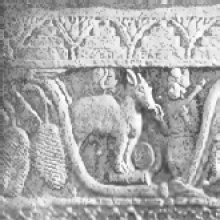Nigrodhamiga Jataka, Nigrodhamiga-jātaka: 1 definition
Introduction:
Nigrodhamiga Jataka means something in Buddhism, Pali. If you want to know the exact meaning, history, etymology or English translation of this term then check out the descriptions on this page. Add your comment or reference to a book if you want to contribute to this summary article.
Images (photo gallery)
In Buddhism
Theravada (major branch of Buddhism)
Source: Pali Kanon: Pali Proper Names(Also called Nigrodha Jataka.) Once the Bodhisatta was born as king of the deer and was called Nigrodha. With him was the leader of another herd, and he was called Sakha. There was an agreement between these two leaders that, on alternate days, a deer from their herd should offer itself to be killed by the king of Benares. One day the turn fell on a pregnant doe of Sakhas herd, and when she asked to be allowed to wait until she had brought forth her young she was refused by Sakha. She then appealed to Nigrodha, who took her turn on himself. Immunity had been granted to Nigrodha, and when his act was reported to the king, he came in person to enquire into the matter. On hearing the story, he was greatly moved, and promised immunity both to Nigrodha and the doe. But Nigrodha was not satisfied till the king promised immunity to all living beings. Later, on discovering that the deer, taking advantage of this, were destroying mens crops, Nigrodha, gave orders to his herd to refrain from doing so.
The story was related in reference to the mother of Kumara Kassapa (q.v.). She had joined the Order under Devadatta not knowing that she was pregnant. On discovering her condition, Devadatta expelled her from the Order. She appealed to the Buddha, who caused an enquiry to be held, and, having been assured of her innocence, he restored her to all honour. When Kumara Kassapa was born he, too, was admitted to the Order.
Devadatta is identified with Sakha, Kumara Kassapa with the does young one, his mother with the doe, and the king with Ananda.
J.i.145ff.; DhA.iii.148f. The story is figured in the Bharhut Stupa (Cunningham: pl. xxv. (1) and xliii. (2). It is given in Mtu. (i.359ff.) with several variations in detail.
Theravāda is a major branch of Buddhism having the the Pali canon (tipitaka) as their canonical literature, which includes the vinaya-pitaka (monastic rules), the sutta-pitaka (Buddhist sermons) and the abhidhamma-pitaka (philosophy and psychology).
See also (Relevant definitions)
Partial matches: Jataka.
Full-text: Shakha, Nyagrodha, Brahmadatta.
Relevant text
Search found 5 books and stories containing Nigrodhamiga Jataka, Nigrodhamiga-jātaka; (plurals include: Nigrodhamiga Jatakas, jātakas). You can also click to the full overview containing English textual excerpts. Below are direct links for the most relevant articles:
Maha Prajnaparamita Sastra (by Gelongma Karma Migme Chödrön)
Nigrodhamiga-jātaka < [Chapter XXVII - The Virtue of Exertion]
Jātaka of the deer who sacrificed himself < [Part 1 - Mahāyānist list of the eighteen special attributes of the Buddha]
Settlement in Early Historic Ganga Plain (by Chirantani Das)
Part 2 - Vārāṇasī-Sārnāth relation < [Chapter VII - Sārnāth: The Satellite Religious Centre]
Part 8 - Rājagṛha supreme seat (c): Jaina sources < [Chapter II - Origin and Function of Rājagṛha as the seat of Monarchy]
The Great Chronicle of Buddhas (by Ven. Mingun Sayadaw)
Biography (28): Kumāra Kassapa Mahāthera < [Chapter 43 - Forty-one Arahat-Mahatheras and their Respective Etadagga titles]
The Jataka tales [English], Volume 1-6 (by Robert Chalmers)
Jataka 12: Nigrodhamiga-jātaka < [Book I - Ekanipāta]
The Mahavastu (great story) (by J. J. Jones)
